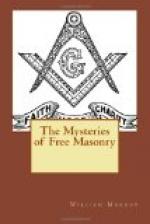The ceremonies, histories, and the Lecture, in the preceding degree are so similar that perhaps some one of the three might have been dispensed with, and the subject well understood by most readers, notwithstanding there is a small difference between the work and history, and between the history and the Lecture.
I shall now proceed with the Mark Master’s degree, which is the first degree in the Chapter. The Mark Master’s degree, the Past Master’s, and the Most Excellent Master’s, are Lodges of Mark Master Masons, Past Master, and Most Excellent Master; yet, although called Lodges, they are called component parts of the Chapter. Ask a Mark Master Mason if he belongs to the Chapter; he will tell you he does, but that he has only been marked. It is not an uncommon thing, by any means, for a Chapter to confer all four of the degrees in one night, viz:—the Mark Master, Past Master, Most Excellent Master, and Royal Arch degrees.
* * * * *
TEST-OATH AND WORD.
The following “test-oath and word” were invented and adopted by the “Grand Lodge” of the State of New York, at their Session in June, 1827, for the purpose of guarding against book Masons. They are given in a Master’s Lodge. They were obtained from a gentleman in high standing in society, and among Masons, but a friend to Anti-Masonry. He was a member of the “Grand Lodge,” and present when they were adopted.
A person wishing to be admitted into the Lodge, presents himself at the door; the Tyler (or some brother from within) demands or asks, “Do you wish to visit this Lodge?” The candidate for admission says, “If thought worthy.” Tyler—“By what are you recommended?” Ans.—“By fidelity.” Tyler says, “Prove that;” at the same time advances and throws out his hand or arm to an angle of about forty-five degrees obliquely forward, the hand open, and thumb upward. The candidate then advances, and places the back of his left hand against the palm of the Tyler’s right hand—still extended puts his mouth to the Tyler’s ear and whispers, L-O-S, and pronounces Los.




